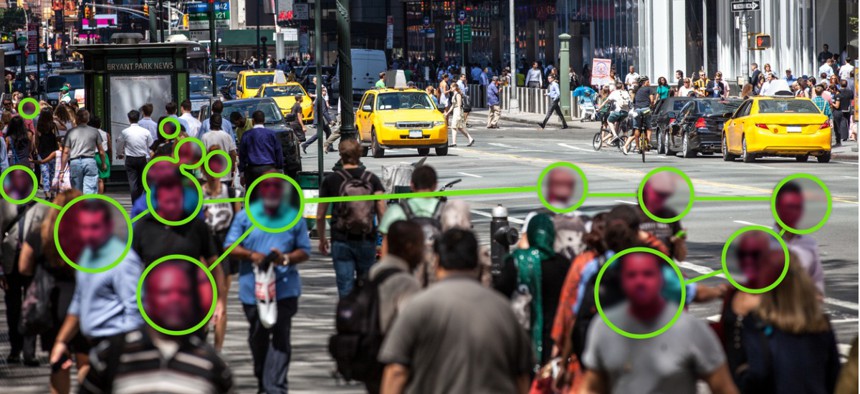Lawmakers Renew Effort to Ban Federal Agencies from Using Facial Recognition Tech

LeoPatrizi/iStock.com
The reintroduced bill would prohibit agencies from using biometric tech and block federal funds for biometric surveillance systems.
A bicameral group of lawmakers has reintroduced legislation that would halt federal government use of biometric technologies like facial recognition.
Sens. Edward Markey, D-Mass., Jeff Merkley, D-Ore., Bernie Sanders, II-Vt., Elizabeth Warren, D-Mass., and Ron Wyden, D-Ore., and Reps. Pramila Jayapal, D-Wash., Ayanna Pressley, D-Mass., and Rashida Tlaib, D-Mich., on Tuesday reintroduced their Facial Recognition and Biometric Technology Moratorium Act. The bill was introduced in both houses in the previous Congress but never made it out of committee, according to the Congress.gov bill tracker.
The bill, which is endorsed by several civil society groups including the American Civil Liberties Union and the Electronic Frontier Foundation, prohibits federal entities from using facial recognition and other biometric technologies as well as prohibits the use of federal dollars for biometric surveillance systems.
The legislation also seeks to limit local entities’ use of biometric technologies by tying receipt of federal grant funding to localized bans on biometric technology. Any biometric data collected in violation of the bill would be banned from use in judicial proceedings as well.
“Facial recognition technology is not only invasive, inaccurate, and unregulated but it has also been unapologetically weaponized by law enforcement against Black people across this country,” Jayapal said in a statement announcing the bill. “That's why I have long called on companies like Amazon to stop selling this technology, and it's why we need to immediately take additional steps to rein in its use. This legislation will not only protect civil liberties but aggressively fight back against racial injustice by stopping federal entities from using facial recognition and biometric surveillance tools while stripping support for state and local law enforcement departments that continue its use.”
The legislation comes as cities including Portland and Boston are enacting bans on facial recognition technologies. Facial recognition technology has been proven to work less effectively on non-white faces, and multiple Black Americans have been wrongfully arrested due to false facial recognition matches.
But federal agencies, such as the Homeland Security Department, have continued advancing the use of biometric technologies. In May, DHS dropped a controversial proposal put forth under the Trump administration that would have expanded biometric collection in immigration-related processes, but the agency still wants some of the “flexibility” the rule was meant to imbue in its biometric collection practices.
More broadly, lawmakers in recent years have increased scrutiny of tech companies and pushed for national consumer privacy law, though efforts to pass such legislation appear to be stalling. States—most recently, Virginia—have begun passing consumer privacy legislation of their own as well.
“Face surveillance technology is so harmful to our safety and privacy, and so discriminatory, that government must not use it at all,” India McKinney, EFF’s director of federal affairs, said in the statement.






